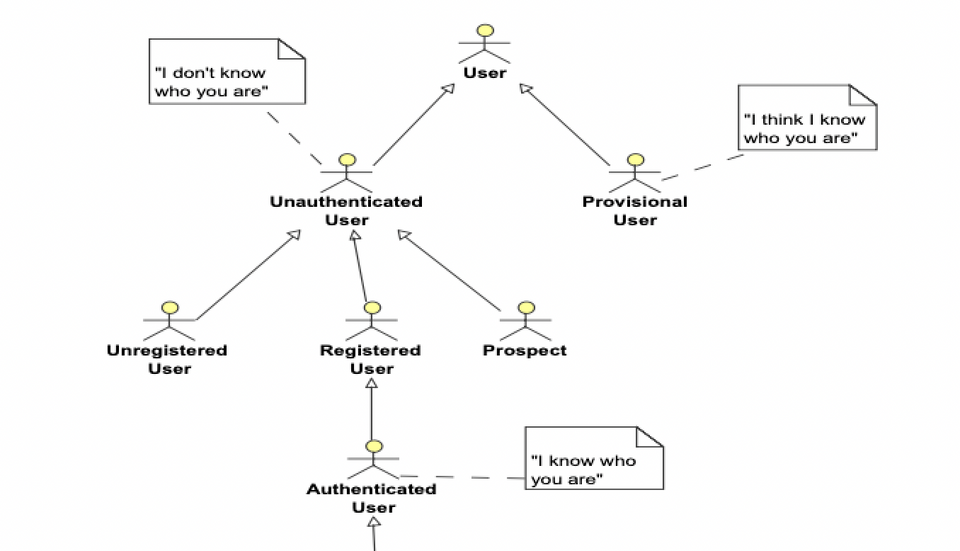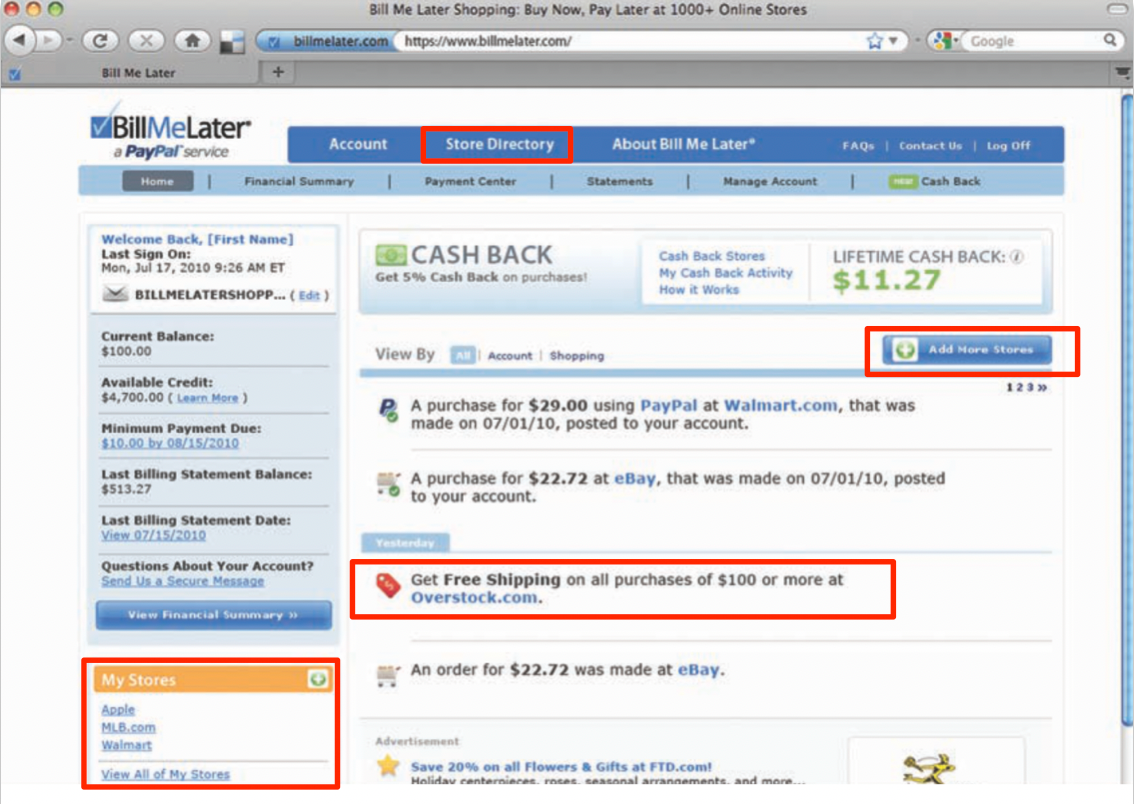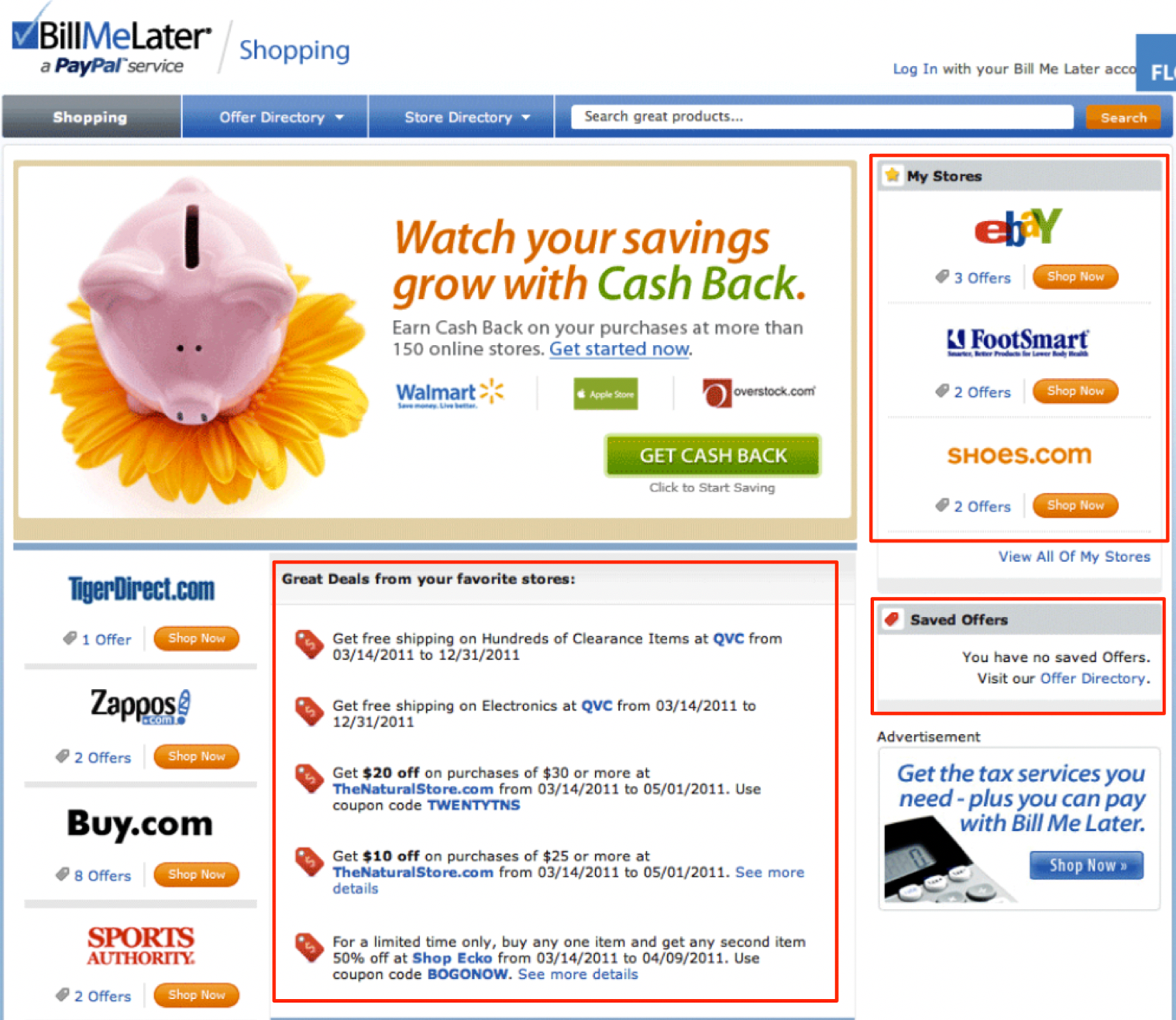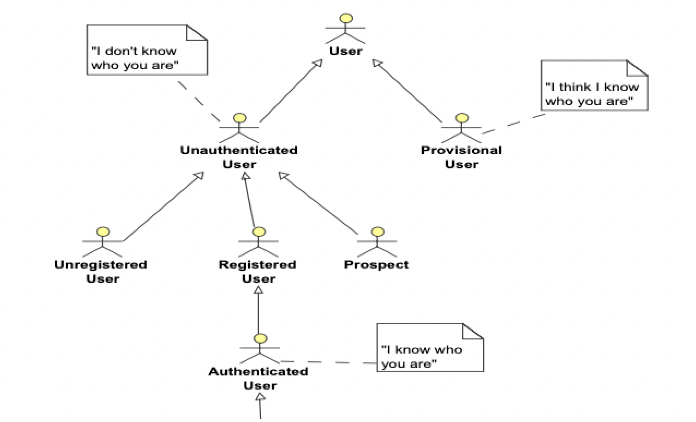Personalization, finally.

Right ad, right time, right place, right person, right?
My career began in 2007 at BillMelater, a pioneer in the online transactional credit space (now commonly referred to as BNPL). Similar to the offerings you see today, a shopper could go to popular sites like Walmart, Overstock, and Hotels.com, choose to checkout with BML, instantly receive a credit decision, and pay over time for their purchase if approved.
The team I was on, led by Greg Lisiewski, started building a 'shopping platform' to take advantage of the large consumer base, merchant network, and purchase data. We signed up with all of the popular affiliate networks, baked 'offers' into various web properties (emails, a shopping portal, and the credit servicing site), and attempted to show relevant offers and stores to shoppers based on both past purchases behavior or explicit actions to save a store or offer to their profile.


(PayPal bought BML in late 2008, hence the branding. But we built all of this pre-acquisition.).
Facebook had a 'personalized feed,' so let's make one for shopping (I think this was Michael Lyden's brainchild). We'd show these offers to users we were certain about, and users we thought we were confident in based on cookies. And although the affiliate business wasn't BML's core business, it quickly brought in several million a year in revenue.

In 2011, I went to work at the leading independent mobile advertising company, Millennial Media (meaning the largest mobile advertising company serving ads on both iOS and Android instead of just one). This was when Groupon and Living Social were becoming all the rage. And the shift to mobile was taking off. I was primarily attracted to the hyper-growth atmosphere, mobile, and the dream of leveling the playing field for small and medium-sized merchants by helping them serve the right ad at the right time and place to the right person – hyper personalization.
Although Millennial was an actual ad network and more sophisticated, the primary concepts of our BML offer platform applied – show things to people who you know or might know based on what they've explicitly told you (well, based on data you have 1st hand) like Facebook was able to do incredibly well, or what you're able to infer and imply based on audiences (aka lookalikes). And while these methods are more personal than complete randomization, they're often far from hyper-personalized because they're not good at factoring in intent. It's also important to highlight that business models impact the level of personalization as well. If a big advertiser like Coca-Cola wants to take over for a weekend with $2m, then you, I, and all our friends were seeing Coca-Cola ads on publishers' properties. If a game developer wants his game in front of everyone for the right amount of money, we will see ads for that game. Far cry from hyper-personalization. As well as from leveling the playing field for the little guy.
Despite the ~500 words above, this isn't a post about adtech.
3.0
Lets fast forward to 2023. For the sake of clarity for future readers, tech headlines are currently dominated by advancements in AI and crises in banking. And personally, I just read the book Outlive: The Science and Art of Longevity by Peter Attia.
Peter elegantly describes his view of medicine's evolution, which I oversimplified in the table below.

In short, he's advocating for a philosophical shift to medicine which should ultimately result in improved lifespan AND healthspan (quality of life). Who really wants to live to 100 if you'll be sick or in pain for 20 of those years? Who really wants to die at 80?
Personalized or precision medicine is a "worthy goal." And while technology advancements (including in ML and AI) will undoubtedly play a role, Peter highlights that tech advancements alone aren't enough to make medicine 3.0 a reality. Tech can be an accelerant and enabler of certain things, but tech can't force a philosophical shift. A move towards a better future focused on long-term outcomes also requires new business models for our healthcare system. As Peter wrote, "nearly all the money flows to treatment rather than prevention... Continuing to ignore healthspan, as we've been doing, not only condemns people to a sick and miserable older age but is guaranteed to bankrupt us eventually." Similarly, advancements in regulatory frameworks could play a role given "medicine 2.0 does not (yet) recognize 'slowing aging' and 'delaying disease' as fully legitimate end points."
Piggybacking on Peter's versions of medicine, one might say the 1.0 of fintech was characterized as the digitization of financial services. Every traditional bank started to offer online banking. E-commerce and online payments were born. One might say 2.0 was characterized by the emergence of non-bank technology companies attempting to disrupt incumbents taking advantage of startup speed to ride the mobile wave. One might say 3.0 will be the era of open banking and maybe even decentralized finance. Or one might say it'll be characterized by hyper-personalization for the sake of improving long-term outcomes, like Peter's vision of medicine 3.0. We can apply the same line of thinking to sub-sectors like insurtech, and other meaningful areas like climate and education.
3.0 Winners
This is the most excited I've been about the potential for improved products and ways of doing things since I started my career as a naive intern. Not only as an investor but also as a consumer.
At this moment, it's impossible to believe that AI won't be a driving force of hyper-personalized products and experiences, that AI won't make people more productive, or that recent AI advancements aren't the most significant potential technical unlock for the unthinkable since cloud and mobile. Like every company would become an internet company, and later a data company, every company will and is becoming an AI company. Everything is advancing so fast that it's impossible to keep up. Fortunately, I have the luxury of working on a team at the forefront led by people like Maddie or Definite founder, Mike Ritchie.
But Peter's insights are prescient. Tech on its own, whether it be AI or something else, isn't enough to create revolutionary, leap-frogging impacts.
The biggest winning businesses of the 3.0 era of [insert your favorite sector] won't just be those incorporating new AI advancements to help supercharge products. They'll also:
- Innovate on business models.
- Philosophically focus on long-term outcomes.
- Take advantage of (or force change) of relevant regulatory frameworks.
And as a result, we'll all win. As Talia pointed out, "the overwhelming beneficiary of the AI revolution is the end user and consumer."
Are early adopters, investors, and technologists hungry for new platform shifts, interfaces, and opportunities? Sure. But it genuinely seems like we're finally at the cusp of actual personalization. If paired with new business models and a philosophical focus on long-term outcomes, this upcoming period should be the most exciting since I can remember. Far more exciting than seeing the evolution from tape to cd to the iPod or the shift from desktop to mobile.
Like Peter said... "worthy goal."
Further Reading Material
- Outlive by Peter Attia
- The biggest beneficiary of the AI space race by Talia Gold
- The Age of AI has begun by Bill Gates
- The Data Advantage in the Foundation Models Era by Maddie Hawkinson
- AI Index Report Summary tweet thread (full report) by Pete Huang
- AI primer by IVP
- Artificial Intelligence and Fintech by Francisco Javier Arceo
- The state of AI in 2022 by McKinsey
- Scared of AGI tweet thread by Arram Sabeti
- The AI Revolution: The Road to Superintelligence on WBW